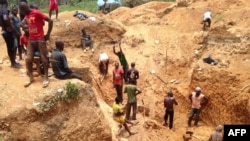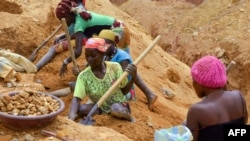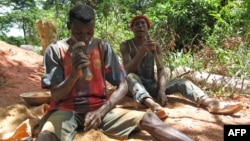Authorities in Cameroon have sealed at least 30 gold mines, including some owned by Chinese, after at least 33 young miners died in landslides this month and scores more were declared missing. Officials said Monday that they are also concerned about working conditions that have caused deaths within the seasonal gold mine community.
A heavy downpour on Monday kept businesses closed in Kambele, a village in Batouri district on Cameroon’s eastern border with the Central African Republic. But 70-year-old gold miner Vidal Dula says he braved the rains to meet with officials of local mining company Invest Batouri. He was asking for help in burying his 27-year-old son Vincent Dula, who died at a mining site on Saturday.
Vidal Dula says Vincent was trapped in a hole where he and 20 miners searched for gold. He says friends dug at the collapsed portion of the gold mine and recovered Vincent’s body. Vidal says the death was a huge loss for his family as Vincent was his only son.
The company has not responded.
Cameroon says Kambele is home to several thousand Cameroonians, Chadian and Central African Republic civilians either working or looking for jobs in gold mines.
On Monday, Djadai Yakouba, the highest-ranking government official in Batouri, said he deployed several hundred government troops to seal at least 30 gold mines in Kambele. Yakouba said the facilities defied a July 2022 government ban on mining activities. He said the troops and humanitarian workers searched for missing miners and recovered corpses buried at collapsed sites.
The central African state’s government officials say at least 33 miners, a majority of them school children on holiday, have died in Kambele within the past month. The government says about 10 children ages nine to 13 were among the dead.
The government did not say if the dead or missing miners were Cameroonians or included displaced persons fleeing conflict in neighboring C.A.R.
Lambert Essono is an environmentalist with Save Cameroon, a non-governmental organization on Cameroon’s eastern border with the C.A.R.
Essono says this year’s heavy rains have increased the number of miners trapped in sites on Cameroon’s eastern border with C.A.R. He says many more deaths may be recorded if miners continue to defy the ban. Therefore, he says, the government of Cameroon should make sure that all mining companies build trenches and retaining walls to protect miners from landslides. Essono says the government should punish mining firms that recruit and keep poor children out of school.
Under Cameroonian law, children under the age of 14 aren’t allowed to work. Essono said poverty pushes parents to send their children to work in mining sites where they are paid $3 after 24 hours of work.
Richard Lambo, spokesperson for Kambele’s mining firms, says the ban on mining activities should be lifted or else the companies, many of them owned by the Chinese, may leave.
Lambo says Korean mining firms left in 2014 when the Cameroon government temporarily sealed mining sites with claims that miners used child labor. He says people who died within the past one month were searching for remains of gold in places mining companies had left. He says it is the duty of the government to stop illegal mining.
The government has not said when the ban will be lifted.
Mining firms say that if they leave, roads that they are building, or renovating, will be abandoned. Miners say the construction of schools, markets and parks, which is part of the companies’ social responsibility, has been halted.
Cameroon says it will make sure the needs of the population are taken care of and that their children have education and health facilities. Cameroon says more 400 mining sites are operating on its eastern border, but that a majority of them are illegal.
The government says it will punish mining companies operating illegally or recruiting children.
Cameroon is a signatory to the Worst Forms of Child Labor Convention adopted by the International Labor Organization on June 17, 1999. A 2011 Cameroonian law states that people involved in child labor could face 15 to 20 years in prison and fines of up to $20,000.






